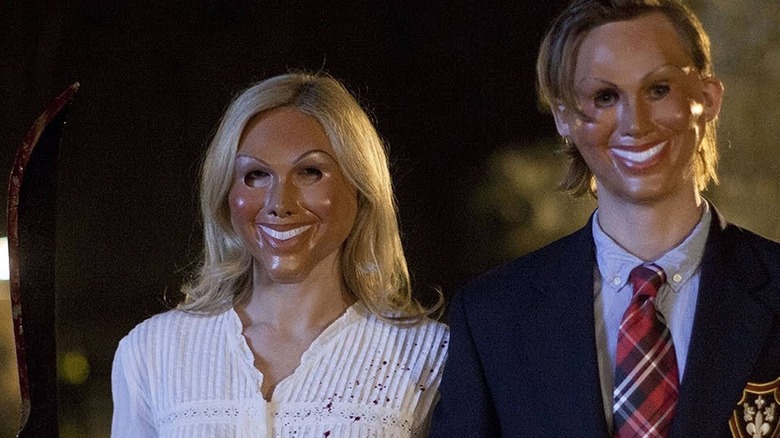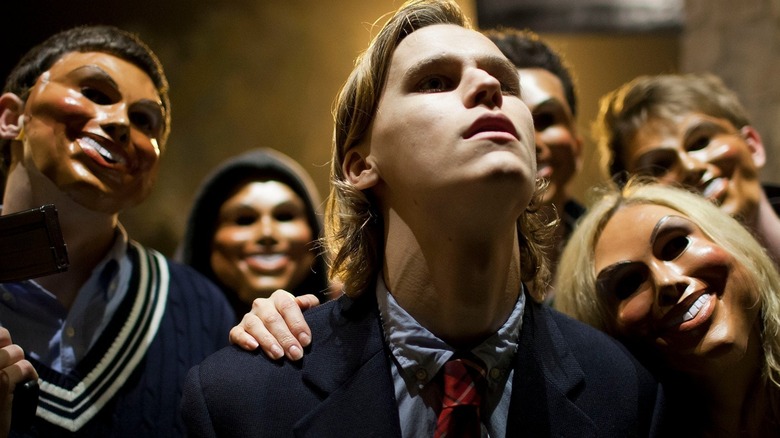The Fuse Of The Purge Franchise Was Sparked By A Real Road Rage Incident
James DeMonaco's 2013 dystopian horror film "The Purge" tantalized audiences with an intriguing premise. In the near future, the world lives in blissful harmony and everyone gets along 364 days out of the year. On the 365th day, however, citizens in suburban areas enclose their houses behind impregnable security gates and hide from the outside world. On that night, all crimes are legal, including murder. The government has instigated a Purge Night, feeling that citizens will be generally peaceful throughout the year if they're granted a night to work out all of their bases impulses.
The original "The Purge" doesn't do a lot with the premise, sadly, staging a pretty run-of-the-mill home invasion thriller. There is an element of class criticism lingering in the background of — the main characters are immensely wealthy — but it wasn't until "The Purge: Anarchy" (2014) and especially in "The Purge: Election Year" (2016) that the full potential of one-night lawlessness was explored. Those films examined class divides, showing that well-armed racists and well-secured rich folks are more likely to survive a Purge than the impoverished ... and that might be the bleak point of creating a Purge in the first place. "Election Year" was one of the best and most timely films of 2016.
"The Purge" was made for $3 million and grossed over $91 million. It was an official hit.
In 2018, to promote the fourth film in the series — titled "The First Purge" — DeMonaco spoke with the Los Angeles Times about his inspiration for creating the franchise and where his bleak premise originated. It seems that "The Purge" began with a moment of wrath he saw from his wife following a frustrating moment in Brooklyn traffic.
The glorious horror of traffic inspired The Purge
DeMonaco has recalled the inciting incident on multiple occasions, telling the Times:
"My wife said something in a road rage incident that stayed with me. This guy almost killed us — and she's a nice person, I hope this doesn't reflect poorly on her — but she said something like, 'I wish I had one a year,' meaning one legal murder. It was a moment of anger, but the idea of one legal murder a year stayed with me."
One can rest assured that DeMonaco's wife didn't actually want to kill the random Brooklyn driver, but I think we can all relate to her anger and flippant, exaggerated suggestion of violence. Of course, that had DeMonaco thinking about various fictional "what-if" scenarios. For Den of Geek, DeMonaco related the above story in 2014, explaining that he, thereafter, moved to France to work on a film. He was struck by how differently French news operates compared to American news:
"I just noticed something different about the news there. I also noticed that nobody owned guns. I know so many people who own guns here, and there are also shows about families who make guns."
Guns and violence were, he observed, a weirdly tenacious element of the American psyche. If the government approved it, he seemed to feel, then people would indeed take advantage of their "one legal murder a year." Which, naturally, chilled him. He turned around and inserted that chill into a pointed political commentary. ("I thought it was a metaphor for America's obsession with guns and violence.") What if, he thought, it wasn't one legal murder, but a whole 12-hour period?
DeMonaco's next film, "The Home," is due in theaters in 2024.

